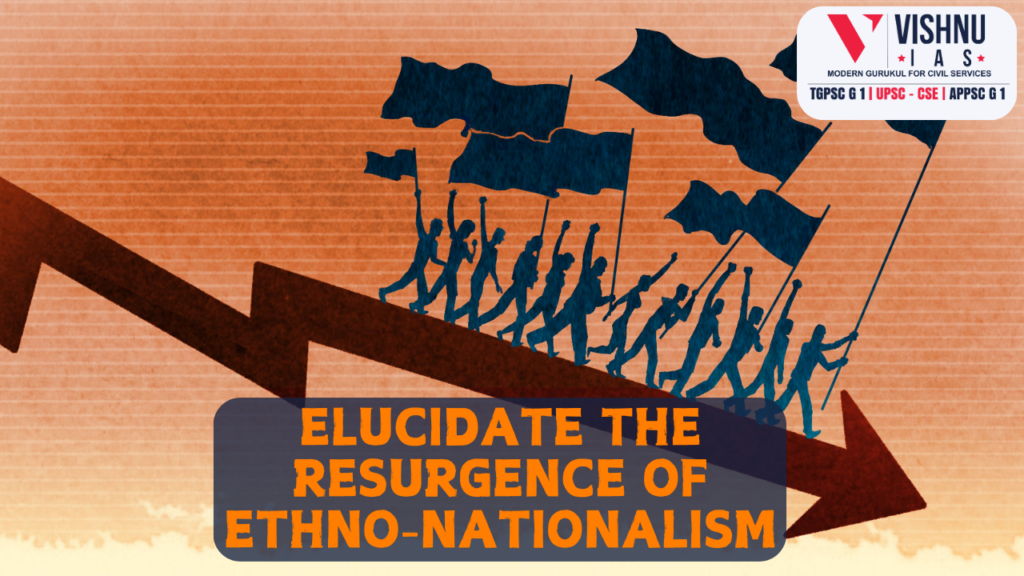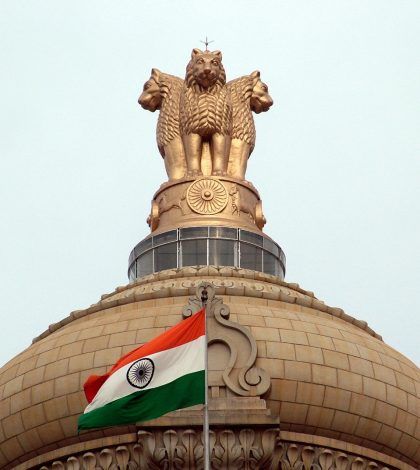Ethno-Nationalism from an Anthropological
Elucidate the resurgence of ethno-nationalism from an anthropological lens.
Approach
- Introduction: add few points regarding the ethno-nationalism
- Body: Elucidate the resurgence of ethno-nationalism from an anthropological lens with how to address the issues with challenges and limitations
- Conclusion: add its contemporary relevance
INTRODUCTION
Ethno-nationalism, or ethno-nationalism, refers to a form of nationalism where the nation is defined in terms of ethnicity. This resurgence has been observed globally, particularly since the end of the Cold War.
BODY
From an anthropological perspective, this phenomenon can be understood through various lenses, including historical, social, and political contexts.
Historical Context
Historically, ethno-nationalism has roots in the formation of nation-states and the colonial era. The drawing of arbitrary borders by colonial powers often grouped diverse ethnic communities together, leading to tensions and conflicts. Post-colonial states have struggled with these legacies, and the resurgence of ethno-nationalism can be seen as a reaction to these historical injustices.
Social and Cultural Factors
- Identity and Belonging:Ethno-nationalism often arise from a desire for a distinct identity and a sense of belonging. Anthropologists study how ethnic groups construct and maintain their identities through language, religion, and cultural practices.
- Cultural Revival: The resurgence of ethno-nationalism can also be linked to cultural revival movements. These movements seek to preserve and promote traditional cultures in the face of globalization and cultural homogenization
Political and Economic Factors
- Political Mobilization:Ethno-nationalism is often used as a tool for political mobilization. Leaders may exploit ethnic identities to gain support and consolidate power. This can lead to the politicization of ethnic differences and the creation of exclusionary policies
- Economic Disparities: Economic inequalities between different ethnic groups can fuel ethno-nationalist sentiments. Marginalized groups may turn to ethno-nationalism as a means of asserting their rights and seeking redress for economic grievances
Globalization and Modernity
- Reaction to Globalization:The rapid pace of globalization has led to fears of cultural erosion and loss of identity. Ethno-nationalism can be seen as a reaction against the perceived threats of globalization, as communities seek to protect their unique cultural heritage
- Modernity and Displacement:Modernization and urbanization have displaced many traditional communities, leading to a sense of alienation and loss. Ethno-nationalism provides a framework for these communities to reclaim their identity and assert their place in the modern world
Case Studies
- Eastern Europe:The breakup of the Soviet Union and Yugoslavia led to the resurgence of ethno-nationalism in Eastern Europe. Ethnic groups sought to establish their own nation-states, leading to conflicts and the redrawing of borders.
- India:In India, ethno-nationalism has manifested in various forms, including the rise of Hindu nationalism. This movement seeks to promote Hindu cultural and religious values, often at the expense of minority communities.
Criticism and Challenges
- Exclusion and Discrimination: Ethno-nationalism often leads to the exclusion and discrimination of minority groups. This can result in social fragmentation and conflict.
- Undermining Democracy: The rise of ethno-nationalism can undermine democratic principles by promoting majoritarianism and eroding the rights of minorities.
- Global Peace and Stability:Ethno-nationalist movements can destabilize regions and lead to conflicts, posing challenges to global peace and stability
M.N Srinivas gave following suggestions to tackle ethno-nationalism:
Creation of natural region based on scientific criteria
Regionalism should not be seen nearly as law and order problem it is a multidimensional issue and should be tackled with sympathy and care
Local should be given preference in certain categories of jobs
There is a need for balanced regional development
CONCLUSION
The resurgence of ethno-nationalism is a complex phenomenon influenced by historical, social, political, and economic factors. From an anthropological perspective, it reflects the ongoing struggles for identity, belonging, and power in a rapidly changing world. Addressing the challenges posed by ethno-nationalism requires a nuanced understanding of these underlying factors and a commitment to promoting inclusive and equitable societies.
Anthropology Full Course at Vishnu IAS Academy
What does Course Offer?
- 4 Months (250+ Class Hours)
- Online (App + Web) / Offline / Hybrid Mode of Classes
- Live + Recorded Videos Access For 1 Year
- 2 Hour Live Class From Monday to Saturday (1.5 Hours for Class + ½ Hour for Doubt Solving)
- Foundation to Advanced Level of Teaching
- Simple and Integrated Content
- One Stop Solution Books
- Regular Value Added Content
- Current Affairs & Case Studies Modules
- Daily Answer Writing Practice
- Weekly Grand Tests On Sundays & Evaluation With Guidance and Topper Will be Rewarded
- 500+ Model Answers
- 9 AM – 9 PM Support System
- Free GS Current Affairs
- Free Interview Guidance for Anthropology


